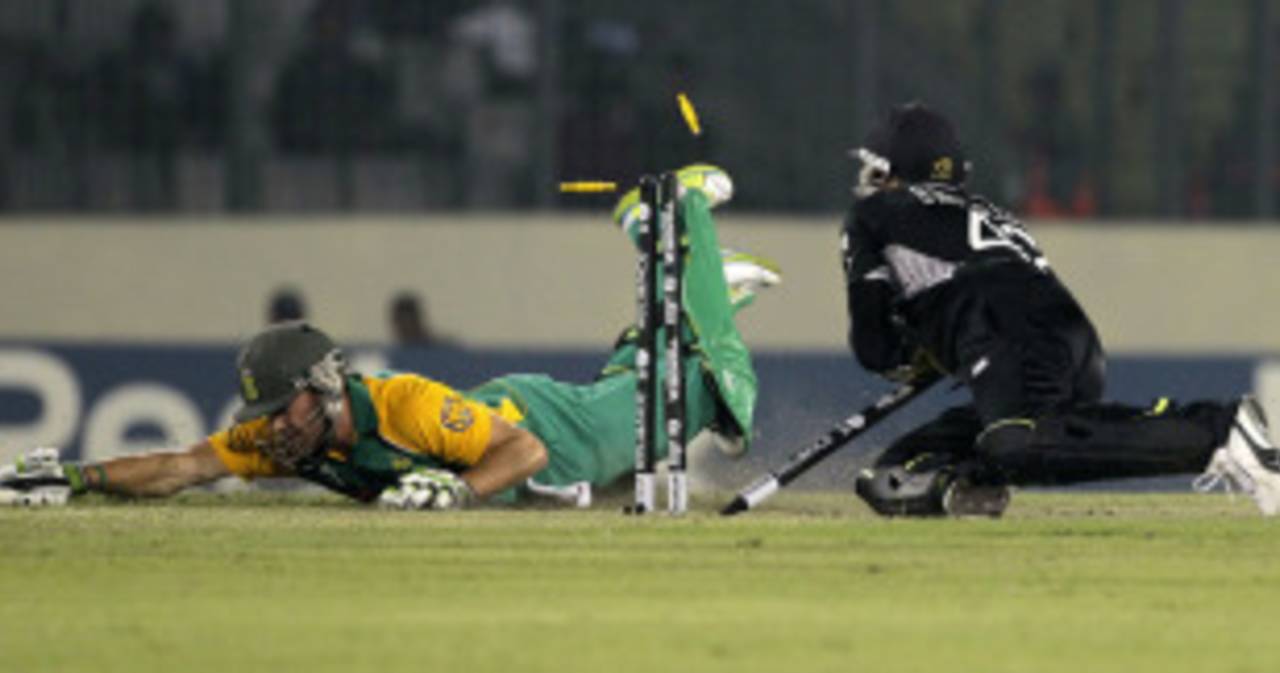At the end of another tumultuous quarter-final in Dhaka, the floodlights went out and fireworks blasted themselves across the Mirpur skies. The explosive din reached a crescendo, and then faded. Bangladesh’s role as World Cup co-hosts was at an end. Then, from the still-packed stands of the Shere Bangla, the supporters who had filled the stadium to watch South Africa and New Zealand struck up a chant: “Bangladesh, Bangladesh, Bangladesh, Bangladesh”.
So it continued for a minute or more, an outpouring of communal pride that touched the soul of cricket. Then a man took hold of the stadium public address system and started reeling off a thank-you list of the tournament sponsors, and normality reasserted itself.
But for that minute, watching and listening on the press box roof from where I had seen the tournament begin in glorious enthusiasm five weeks ago, it was an entrancing moment, moving and hopeful, for Bangladesh as a nation and for cricket as a sport. If the 2007 World Cup skated across the Caribbean leaving barely a trace of its passing, this one will surely leave a deep and lasting imprint on this country at least.
This, of course, will do little to lighten the mood this morning in South Africa. Both sides fluctuated between brilliance and flawlessness in the field, and both bowling attacks applied constricting pressure throughout. The game was decided by slight but fatal errors by Graeme Smith and Jacques Kallis, dismissed by a wide one and a long hop respectively, which prompted a three-ball brain melt in which JP Duminy self-immolated and Faf du Plessis momentarily forgot one of the two things I imagine he was thinking to himself as he walked to the wicket:
Thought 1: “I must try not to get myself out.” Thought 2: “Even more importantly than that, I absolutely must try my best not to run out AB de Villiers after he has just hit three sublime boundaries on a pitch where others have struggled to time the ball and two balls after our last experienced international batsman took an inopportune ride on board the Crazy Train, and bought a one-way single to Pavilion Central. Remember that, young Faf, and remember it well.”
South Africa’s patent Achilles heel, their elongated tail, was exposed, and New Zealand maintained ruthless pressure. Where India beat Australia with decisively good play, South Africa lost to New Zealand due to decisively bad play. Only Johan Botha was dismissed without batting error. The Kiwis closed out the victory through their own excellence, but the game turned on an outbreak of self-inflicted South African chaos. South Africa placed New Zealand’s hands on their own throat. New Zealand gleefully and clinically completed the strangle.
Smith’s men needed 4.5 per over for 25 overs with 8 wickets in hand, with one certified and one potential future greats of the game at the crease. Constricting bowling should not have been enough. If making pivotal errors of decision-making and execution at crucial stages constitutes a choke, then this was certifiably a choke. A fast-acting, quick-spluttering, unHeimlichManoeuvrable choke. And it was painful to watch, even as an Englishman.
● Jesse Ryder played the day’s most important innings with skill, power, restraint and determination, but the best strokeplay was unfurled by de Villiers. He hit four boundaries. The first was a simple on-side drive from a Woodcock full toss. The next two were shots of breathtaking execution and class. First, Oram bowled a good length ball that would have passed inches from the top of off-stump. De Villiers, with a break of the wrists, drove it just behind point at bullet speed.
Two overs later, Southee bowled another perfectly sound ball, heading towards middle stump on an acceptable length. This time, de Villiers leant forward, eased through an unhurried swing, and the ball hurtled between mid-off and extra-cover as if it was rushing home to check whether or not it had left its oven on. Four overs after this, he placed his magic bat in the path of another Southee delivery, full and straight, and within seconds the ball was having a cup of tea and a chinwag with the straight-long-on boundary and the sightscreen.
The next over, Duminy conked out, du Plessis called de Villiers for a single which was as well-advised as French kiss with a crocodile, and the game was decisively broken.
De Villiers could, perhaps would, have won the match for South Africa with merely competent support. Being chainsawed by his own team-mate was a definite procedural glitch. Or the greatest tactical howler in the history of sport. At least since plucky British boxer Micky ‘Bread-Fists’ Sprank tried to prevent Muhammad Ali landing an early knock-out punch by smashing himself on the head with a heavy-based frying pan in the opening seconds of round 1.
In my cricket-obsessed youth, whilst my contemporaries were reading valuable tomes from the library of teenage life (such as The Art Of Efficacious Flirting, and Drinking Lots And Falling Over – How To Simultaneously Cause And Mitigate Personal Embarrassments), I spent most of my time snout down in cricket books, truffling for statistics or insights into the history of the game which I played with such minimal distinction and in which I would go on to conclusively not represent my country.
I remember reading a description of Len Hutton’s batting, I think by John Arlott, in which the great Yorkshireman was described as seeming to have electricity in his forearms. At the time, I could not fully envisage what the writer meant by this. Watch those de Villiers boundaries. That is what he meant.
Andy Zaltzman is a stand-up comedian, a regular on the BBC Radio 4, and a writer
